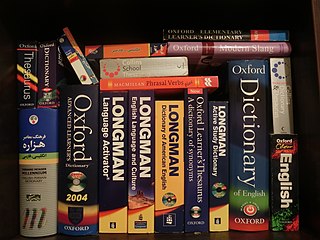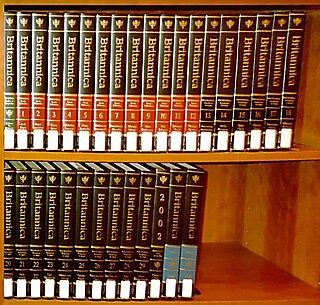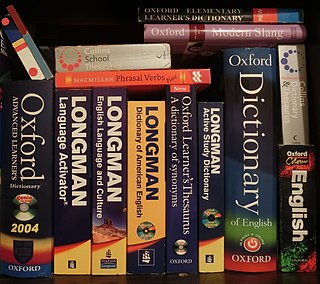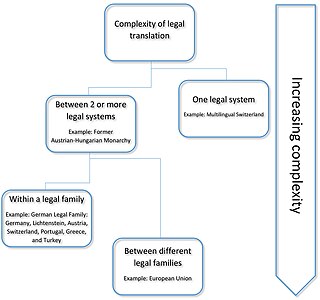
A dictionary is a listing of words in one or more specific languages, often arranged alphabetically, which may include information on definitions, usage, etymologies, pronunciations, translation, etc. or a book of words in one language with their equivalents in another, sometimes known as a lexicon. It is a lexicographical reference that shows inter-relationships among the data.

An encyclopedia or encyclopaedia is a reference work or compendium providing summaries of knowledge either from all branches or from a particular field or discipline. Encyclopedias are divided into articles or entries that are often arranged alphabetically by article name and sometimes by thematic categories. Encyclopedia entries are longer and more detailed than those in most dictionaries. Generally speaking, unlike dictionary entries—which focus on linguistic information about words, such as their etymology, meaning, pronunciation, use, and grammatical forms—encyclopedia articles focus on factual information concerning the subject named in the article's title.
Lexicography is divided into two separate but equally important groups:
Corpus linguistics is the study of language as expressed in corpora (samples) of "real world" text. Corpus linguistics proposes that reliable language analysis is more feasible with corpora collected in the field in its natural context ("realia"), and with minimal experimental-interference.
Terminology is a general word for the group of specialized words or meanings relating to a particular field, and also the study of such terms and their use, this also known as terminology science. Terms are words and compound words or multi-word expressions that in specific contexts are given specific meanings—these may deviate from the meanings the same words have in other contexts and in everyday language. Terminology is a discipline that studies, among other things, the development of such terms and their interrelationships within a specialized domain. Terminology differs from lexicography, as it involves the study of concepts, conceptual systems and their labels (terms), whereas lexicography studies words and their meanings.

In corpus linguistics, a collocation is a series of words or terms that co-occur more often than would be expected by chance. In phraseology, collocation is a sub-type of phraseme. An example of a phraseological collocation, as propounded by Michael Halliday, is the expression strong tea. While the same meaning could be conveyed by the roughly equivalent powerful tea, this expression is considered excessive and awkward by English speakers. Conversely, the corresponding expression in technology, powerful computer is preferred over strong computer. Phraseological collocations should not be confused with idioms, where an idiom's meaning is derived from its convention as a stand-in for something else while collocation is a mere popular composition. The ability to use English effectively involves an awareness of a distinctive feature of the language known as collocation. Collocation is that behaviour of the language by which two or more words go together, in speech or writing.
Henning John Bergenholtz is a Danish linguist, who is head of Center for Lexicography at Aarhus School of Business in Denmark. Professor Bergenholtz has contributed to lexicography as a science with publications on theoretical lexicography as well as several printed and electronic dictionaries.
Sandro Nielsen is a Danish metalexicographer, Associate Professor at Centre for Lexicography at the Aarhus School of Business, Denmark, from where he received his PhD in 1992. Nielsen has contributed to lexicography as a theoretical and practical lexicographer with particular reference to bilingual specialised dictionaries. He is the author and co-author of more than one hundred publications on lexicography, theoretical papers, printed and electronic (online) dictionaries.
Legal lexicography is the complex of activities concerned with the development of theories and principles for the design, compilation, use, and evaluation of dictionaries within the field of law, see e.g. Nielsen 1994.
A language-for-specific-purposes dictionary is a reference work which defines the specialised vocabulary used by experts within a particular field, for example, architecture. The discipline that deals with these dictionaries is specialised lexicography. Medical dictionaries are well-known examples of the type.
A specialized dictionary is a dictionary that covers a relatively restricted set of phenomena. The definitive book on the subject includes chapters on dictionaries of:

A law dictionary is a dictionary that is designed and compiled to give information about terms used in the field of law.

Legal translation is the translation of language used in legal settings and for legal purposes. Legal translation may also imply that it is a specific type of translation only used in law, which is not always the case. As law is a culture-dependent subject field, legal translation is not necessarily linguistically transparent. Intransparency in translation can be avoided somewhat by use of Latin legal terminology, where possible.
Lexicographic information cost is a concept within the field of lexicography. The term refers to the difficulties and inconveniences that the user of a dictionary believes or feels are associated with consulting a particular dictionary or dictionary article. For example, the extensive use of abbreviations in articles in order to save space may annoy the user, because it is often difficult to read such condensed texts and understand the abbreviations, thereby increasing the lexicographic information costs.
Specialized lexicography is an academic discipline that is concerned with development of theories and principles for the design, compilation, use and evaluation of specialized dictionaries. A specialized dictionary is a dictionary that covers a relatively restricted set of phenomena, usually within one or more subject fields. An alternative term for this type of dictionary is LSP dictionary.
A book review is a form of literary criticism in which a book is merely described or analyzed based on content, style, and merit. A book review may be a primary source, opinion piece, summary review or scholarly review. Books can be reviewed for printed periodicals, magazines and newspapers, as school work, or for book web sites on the Internet. A book review's length may vary from a single paragraph to a substantial essay. Such a review may evaluate the book on the basis of personal taste. Reviewers may use the occasion of a book review for an extended essay that can be closely or loosely related to the subject of the book, or to promulgate their own ideas on the topic of a fiction or non-fiction work.

A bilingual dictionary or translation dictionary is a specialized dictionary used to translate words or phrases from one language to another. Bilingual dictionaries can be unidirectional, meaning that they list the meanings of words of one language in another, or can be bidirectional, allowing translation to and from both languages. Bidirectional bilingual dictionaries usually consist of two sections, each listing words and phrases of one language alphabetically along with their translation. In addition to the translation, a bilingual dictionary usually indicates the part of speech, gender, verb type, declension model and other grammatical clues to help a non-native speaker use the word. Other features sometimes present in bilingual dictionaries are lists of phrases, usage and style guides, verb tables, maps and grammar references. In contrast to the bilingual dictionary, a monolingual dictionary defines words and phrases instead of translating them.
Beryl T. (Sue) Atkins is a British lexicographer, specialising in computational lexicography, who pioneered the creation of bilingual dictionaries from corpus data.
English lexicology and lexicography is that field in English language studies which examines English word-formation, the evolution of vocabulary and the composition of English dictionaries.
Heidrun Gerzymisch is a German Translation scholar and emeritus professor at Saarland University in Saarbrücken, where she held the Chair for "English Linguistics and Translation Science" from 1993 to 2009. She is in 2014 responsible for the international PhD prep school "MuTra" at Saarland University’s Graduate Center GradUS and lectures Translation at the Zurich University of Applied Sciences (ZHAW).





